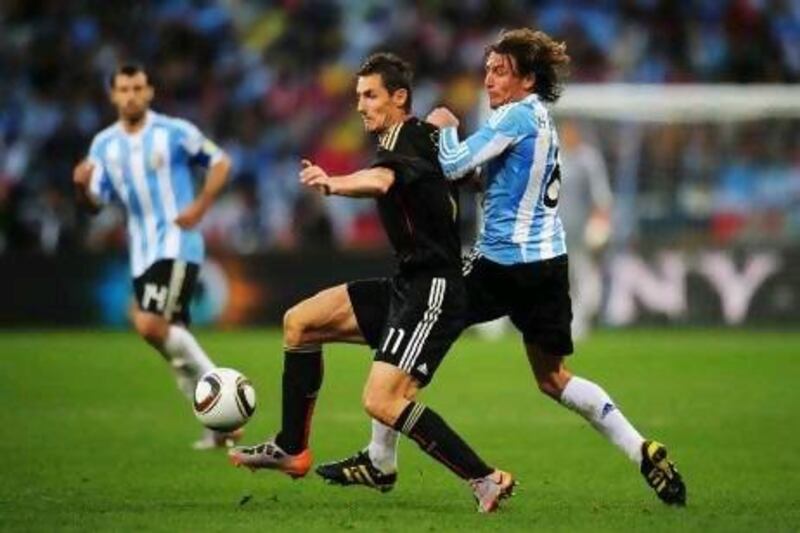If 10 years ago, somebody had mentioned that the German national football team would play a major match tonight on TV, I would have felt indifference and maybe even forged a slight groan.
I probably would have watched, but I would have sunk steadily into the sofa and wondered why I watched, sort of like I do half the time anyway.
Tomorrow night, many of us will watch Germany play a major match on TV and I cannot wait to see it. I will watch without fear of morphing into one with the sofa.
Ten years ago, I visited Germany on that amazing train ferry from Denmark, and the idea of Germany caused me indifference if not groans. I went to Hamburg and liked it, but the Germany portion of the trip was an afterthought, a stopover en route home.
Last year I went to Germany twice, once during the Women's World Cup and once for New Year's Eve in Berlin, and I cannot wait to see it again.
I will go without hesitation toward one of the most energetic, cosmopolitan, I-would-live-there places on earth, circa 2012, a destination deeply underrated amid the eternal (and justified) England-France-Italy romantising.
It might be classic over-thinking to connect the recent-years German national football side with the cliche-by-now "new Germany", but I have enjoyed the thought.
In the way national teams often seem to reflect national cultures, with Brazil long the shiniest example, the Germany on the pitch seems to mirror the Germany on the streets. It works well but has grown some glamorous panache.
Pinpointing my pivot is easy: June 13, 2010, a Sunday. The World Cup had begun. People said the manager Joachim Loew might be in trouble, but then, people say every manager everywhere might be in trouble pretty much except for Sir Alex Ferguson.
I knew just a few things, as usual. I knew that when Germany played Argentina in a 2006 World Cup quarter-final, I disliked Germany's win on penalties, not because of any anti-German sentiment but because it ridded the tournament of the team I found most gorgeous, Argentina with that 26-pass goal against Serbia and Montenegro.
Further, I knew that the German team that made the Euro 2008 final seemed fine but not especially alluring as utterly the second-best and second-most-exhilarating team in Spain's 1-0 win.
So I felt neither contempt nor curiosity for Germany as I sat down to watch them play Australia, but I did feel intensely nervous.
A newspaper had assigned me to live-blog the match and it's a timeworn truth that little can rattle the nerves so effectively as a first turn at live-blogging.
I figured Australia might be interesting with the veterans who got them into the knockout round in 2006 and loosed a goose-bumpy rendition of Waltzing Matilda in a London pub.
What ensued, most of us recall, was that Germany were riveting. Muller, low in the box, back out to Podolski. Lahm on a gorgeous long thing to Klose for a header just in time. Podolski, on a brilliant rush that led to Muller turning around and finishing. Badstuber, crossing to Cacao. Australia got the cruel red on Tim Cahill, and I lost several months off the back of my life live-blogging, but, well, that certainly didn't look like Germany.
Here were some kids running around with verve, a thrilling 21-year-old third-generation Turkish-German (Mesut Ozil), a 20 year old in injured Michael Ballack's shirt (Thomas Muller), et al.
More of same would come, of course, especially in another Germany-Argentina quarter-final in which the loveliness had switched sides from 2006. In a way, it seemed unfitting that the aftermath of the 4-0 in Cape Town focused so much on Diego Maradona's loud coda as Argentina manager, because the systematic destruction Germany wreaked on both ends of the pitch caused a rarity: a top-tier football nation, annihilated.
And if anything, the goals against Argentina dazzled even more than the batch against Australia.
Of course, Spain came along to do what Spain do with possession – hog it – and out went Germany, but the idea of watching Germany had changed, and remains changed even though the theme has ground down some by 2012 as themes tend to do. A roster with Ozil and Mario Gomez and Podolski and Muller and Klose still mingled with possibly the greatest name in the history of sport, Bastian Schweinsteiger, has made the team as enticing as a homeland that feels increasingly thrilling, enough to make you wonder if you should ask the embassy a question:
Would you guys mind letting me live in Berlin someday?
Follow us
[ @SprtNationalUAE ]





